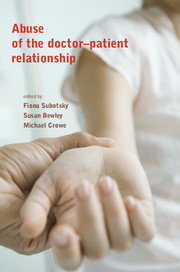Book contents
- Frontmatter
- Contents
- List of figures, tables and boxes
- List of contributors
- Foreword
- Introduction: mapping the territory
- 1 The ethical importance of boundaries to intimacy
- 2 The patient's perspective: impact and treatment
- 3 Teaching ethics and ethical behaviour to medical students
- 4 With the benefit of hindsight: lessons from history
- 5 The prevalence of boundary violations between mental health professionals and their clients
- 6 Psychiatry: responding to the Kerr/Haslam Inquiry
- 7 The general practitioner and abuse in primary care
- 8 Boundaries and boundary violations in psychotherapy
- 9 Sexual therapies: ethical guidelines, vulnerabilities and boundaries
- 10 Obstetrics and gynaecology: a special case?
- 11 Nurses as abusers: a career perspective
- 12 Medical management: governance and sexual boundary issues
- 13 Dealing with offending doctors: sanctions and remediation
- 14 Defending doctors: the protection society's experience
- 15 Regulation and its capacity to minimise abuse by professionals
- 16 The role of the General Medical Council
- Appendix 1 Extract from Vulnerable Patients, Safe Doctors
- Appendix 2 Codes of ethics of psychiatric associations in other countries
- Appendix 3 Guidance from the Council for Healthcare Regulatory Excellence
- Appendix 4 Examples of determinations by the General Medical Council's Fitness to Practise panels
- Appendix 5 Website resources and information
- Index
- Plate section
11 - Nurses as abusers: a career perspective
Published online by Cambridge University Press: 02 January 2018
- Frontmatter
- Contents
- List of figures, tables and boxes
- List of contributors
- Foreword
- Introduction: mapping the territory
- 1 The ethical importance of boundaries to intimacy
- 2 The patient's perspective: impact and treatment
- 3 Teaching ethics and ethical behaviour to medical students
- 4 With the benefit of hindsight: lessons from history
- 5 The prevalence of boundary violations between mental health professionals and their clients
- 6 Psychiatry: responding to the Kerr/Haslam Inquiry
- 7 The general practitioner and abuse in primary care
- 8 Boundaries and boundary violations in psychotherapy
- 9 Sexual therapies: ethical guidelines, vulnerabilities and boundaries
- 10 Obstetrics and gynaecology: a special case?
- 11 Nurses as abusers: a career perspective
- 12 Medical management: governance and sexual boundary issues
- 13 Dealing with offending doctors: sanctions and remediation
- 14 Defending doctors: the protection society's experience
- 15 Regulation and its capacity to minimise abuse by professionals
- 16 The role of the General Medical Council
- Appendix 1 Extract from Vulnerable Patients, Safe Doctors
- Appendix 2 Codes of ethics of psychiatric associations in other countries
- Appendix 3 Guidance from the Council for Healthcare Regulatory Excellence
- Appendix 4 Examples of determinations by the General Medical Council's Fitness to Practise panels
- Appendix 5 Website resources and information
- Index
- Plate section
Summary
Introduction
As a student nurse in 1970, I witnessed a male nurse administering an enema in a cruel and forceful manner to a frail elderly man who had been in a mental hospital for most of his adult life. This man, bereft of any friends and family, suffered a wretched existence in an overcrowded and underresourced ward with a maximum of three nursing staff on duty at any one time for 44 patients. I asked why the nurse had to be so rough. Was there not an alternative to assisting the patient to open his bowels other than via an enema? It was explained that the patient frequently suffered from constipation and that an enema was the only effective way of ‘dealing with him’. The patient disliked the tube being inserted into him. However, as he was so frail, any attempt to prevent it could hardly be described as ‘resistant to treatment’, which is the expression the male nurse used. It occurred to me that the patient's reluctance had more to do with the attitude of the nurse than a conscious decision to resist the enema. In attempting to justify his conduct the nurse stated that in nursing you sometimes have to be ‘cruel to be kind’.
In a sympathetic discussion with an experienced colleague it was clear that within the old mental hospital system there was a tolerance of mistreatment of patients. Many reasons were put forward to explain poor practice, such as low staffing, isolation, low expectations from relatives, and a low expectation from staff of their ability to help.
Why do nurses abuse patients?
At the annual conference of the Psychiatric Nurses Association in 1981, in response to a talk on allegations of mistreatment, a delegate and manager of a community nursing service, Tom McKervey, asked why there was so little research into understanding why nursing staff might abuse patients. He made the point that, in his experience, when an allegation of mistreatment occurred, everything was geared to the investigation. This would ultimately decide whether or not the allegation was proven. If so, appropriate action would be taken against the nurse.
- Type
- Chapter
- Information
- Abuse of the Doctor-Patient Relationship , pp. 127 - 137Publisher: Royal College of PsychiatristsPrint publication year: 2010



